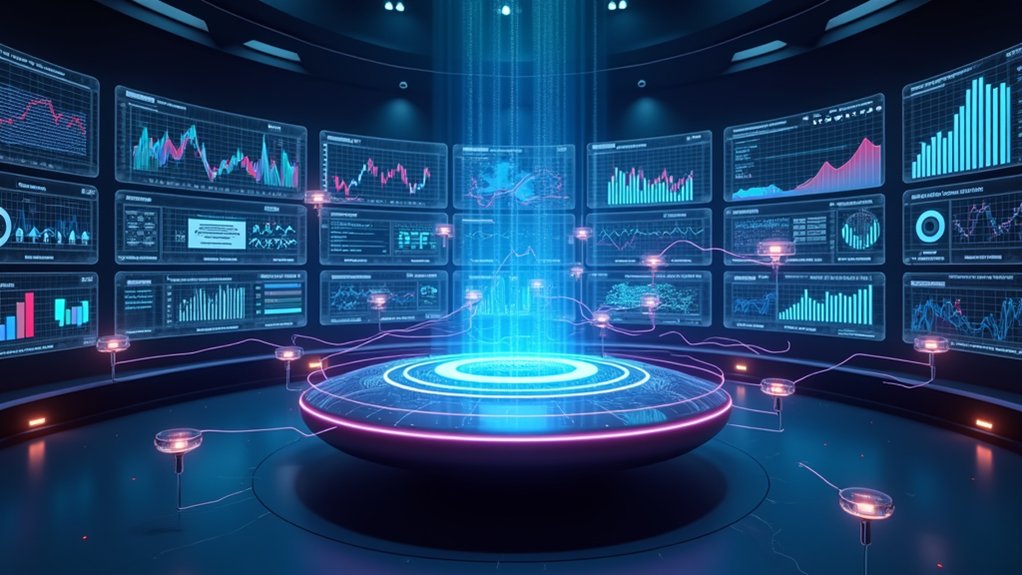Can Artificial Intelligence Revolutionize Advertising Effectiveness?
Artificial intelligence is revolutionizing advertising effectiveness through data-driven personalization and automation. With the AI marketing sector projected to reach $107.5 billion by 2028, 88% of marketers now incorporate AI into daily operations. The technology enables hyper-personalized campaigns, identifies high-value audience segments, and can increase leads by up to 50%. Netflix exemplifies this transformation, generating approximately $1 billion annually through AI-powered recommendation systems. Further exploration reveals how generative AI capabilities are reshaping creative asset production across industries.

With the marketing landscape continuing to advance at an unprecedented pace, artificial intelligence has emerged like a transformative force reshaping how brands connect with consumers across digital channels. The AI in marketing market, currently valued at $47.32 billion in 2025, is projected to reach $107.5 billion by 2028, representing a compound annual growth rate of 36.6%. This remarkable expansion reflects the industry’s recognition of AI’s potential to deliver unprecedented levels of personalization, efficiency, and data-driven decision making.
AI isn’t just changing marketing—it’s revolutionizing how brands forge meaningful connections in the digital era
The adoption statistics demonstrate AI’s move from experimental technology to essential business tool, with 88% of marketers now incorporating AI into their daily operations. Companies increasingly view artificial intelligence as a competitive necessity rather than a luxury, with 83% prioritizing AI in their business strategies. This widespread incorporation spans various marketing functions, from content creation to media planning and campaign optimization. The significant increase in AI adoption has been particularly noticeable post-COVID-19 as companies seek more efficient digital solutions.
AI’s impact on advertising effectiveness manifests in multiple dimensions. Netflix exemplifies the revenue potential, generating approximately $1 billion annually through AI-powered recommendation systems. Beyond entertainment, AI enables hyper-personalized advertising across channels by analyzing vast datasets to identify high-value audience segments and predict consumer behavior patterns. The technology streamlines workflows by automating routine tasks, allowing marketing professionals to focus on strategic initiatives rather than repetitive processes. AI algorithms have demonstrated the ability to increase leads by as much as 50%, offering substantial return on investment for advertisers. Modern AI marketing tools leverage natural language processing to generate tailored messaging that resonates with specific audience segments.
Generative AI represents a particularly transformative subset, with market projections indicating growth from $62.75 billion in 2025 to $356.05 billion by 2030. These tools produce scalable creative assets including ad copy and visuals, while maintaining brand consistency across automated outputs. Organizations utilize these capabilities to develop multilingual campaigns with automated language adaptation and dynamic visuals tailored to individual preferences.
While artificial intelligence continues to advance, its applications in advertising will likely expand further. The technology’s ability to process and derive insights from complex datasets, coupled with increasingly sophisticated content generation capabilities, positions AI as a fundamental component of future advertising strategy.
With barriers to entry lowering through accessible AI platforms, the technology’s transformative impact on advertising effectiveness appears positioned for continued acceleration.
Frequently Asked Questions
How Much Does AI Advertising Technology Typically Cost?
AI advertising technology costs vary considerably based on implementation scope and complexity.
Project-specific solutions range from $1,000-$10,000 annually for basic implementations, while enterprise-level custom combinations often exceed $25,000.
Pricing structures include one-time combination fees, subscriptions, performance-based contracts, and hybrid models.
Cost drivers include data volume, combination complexity, specialized talent requirements, and regulatory compliance needs.
Organizations can reduce expenses through pre-built platforms, open-source frameworks, and managed services.
Can Small Businesses Afford AI Advertising Solutions?
Small businesses can often afford AI advertising solutions through tiered pricing structures. Entry-level AI tools offer free plans or modest subscriptions ($14-49/month), while more extensive marketing platforms range from $80-698/month depending on capabilities and user requirements.
The average small business spends approximately $1,800 annually on AI technologies. However, businesses must account for potential hidden costs including assimilation expenses, per-seat pricing increases, and minimum contact requirements when calculating total investment against expected ROI and operational efficiencies.
What Privacy Concerns Arise With Ai-Powered Advertising?
AI-powered advertising raises significant privacy concerns across multiple dimensions: unauthorized data collection through scraping, inadequate transparency in algorithmic decision-making, potential misuse of personal information for hyper-targeted campaigns, and regulatory gaps in governance frameworks.
Consumer trust remains low, with approximately 70% of Americans distrusting companies’ AI practices and 63% specifically concerned about data scraping.
The complexity of AI systems further complicates individual control over personal information, while existing legal structures struggle to address emerging challenges.
How Quickly Can Businesses See ROI From AI Advertising?
Businesses implementing AI advertising tools typically see ROI within variable timeframes based on implementation type.
YouTube AI campaigns show measurable improvements within single campaign cycles, while Demand Gen strategies enhance existing campaigns within weeks.
Broad Match AI delivers faster ROAS improvements than manual keyword management.
For extensive solutions, Performance Max implementations generally yield measurable results within 2-3 months, with integrated multi-tool approaches (VRC + VVC) accelerating performance gains compared to single-tool deployments.
What Technical Skills Are Needed to Implement AI Advertising Tools?
Implementing AI advertising tools requires a multifaceted technical skill set, including: prompt engineering expertise for crafting effective AI instructions; data analysis capabilities to interpret campaign results; programming knowledge (particularly Python or JavaScript); database management skills for handling customer information; API connectivity abilities to connect various platforms; and understanding of machine learning concepts to optimize campaign performance over time.
Additionally, professionals should possess working knowledge of cloud computing environments where most AI advertising solutions operate.